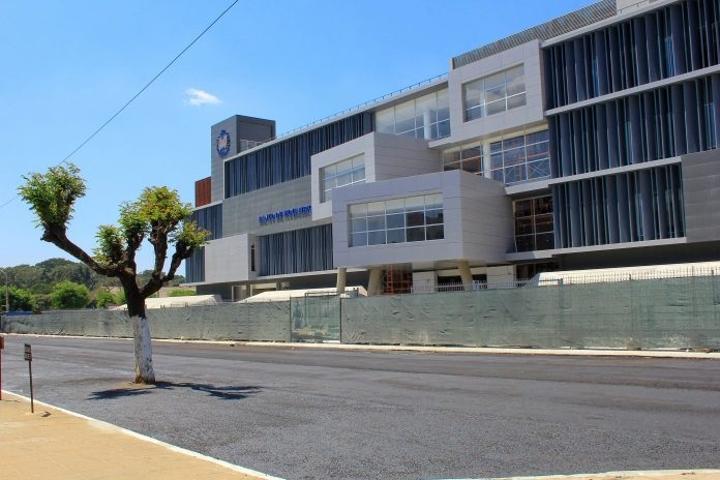Africa-Press – Mozambique. The imbroglio between the Rajahussein Gulamo group and the Bank of Mozambique over the disputed ownership of the land plot where the central bank is currently building its new Nampula branch continues set the parties at loggerheads, Jornal Ikweli reports.
According to what Ikweli heard, the Rajahussein Gulamo business group is the legal holder of the Land Right title (DUAT), by decision of the Administrative Tribunal Plenary, in a ruling handed in 2016 under number 7/2016.
In the Nampula business community, comment and discussions around the issue are still on the rise, with some saying the business group is right, and others disagreeing.
Ikweli spoke to Momade Aquil Rajahussein, of the group in question. He said he regrets the situation, and does not understand why the central bank’s administration is acting with such bad faith, despite the illegality it is committing.
“The ownership of the land plot was achieved between 2001/2002. It was a transparent process that followed legal procedure,” Momade Aquil Rajahussein asserts.
He recalls how the issues involving«g the Central Bank and its Nampula branch started.”We [Rajahussein Gulamo group] were not contacted by the Municipality – we only noticed [that someone else was in the land] when the zinc sheets were placed around the plot. We were not sure why the Bank of Mozambique had started the work,” since the group was the DUAT titleholder.
How a hotel would pose “a security risk” to the provincial governor
“This is a complex process, and one that has taken a long time,” Momade Rajahussein says.
Reserved and not very open to discussion in the media, although he agreed to speak to our newspaper, Rajahussein tells us:“We were notified by the Municipality of Nampula, in the years 2010/2011, to tell us that the project that we had – to build a hotel – would not go forward because there were risk issues – which were posed in terms of physical risks against the governor of the province – because the plot is one street away from the provincial government building”.
At that time, he continued, “we appealed for the nullity of the Municipality’s administrative act because the Mayor does not have the authority to revoke DUAT titles. That should have been an act made by the Court”, so, “at that time we appealed, through an administrative complaint, to the Minister of State Administration.
“We received the answer, and not satisfied with the response, we wrote, through an exposition, to the then President of the Republic. We got an answer saying that this matter of land litigation should not be discussed at government level, but in court because the legal opinion of the presidency pointed out that this discussion has to be carried out in court. And that’s what we did.
“When we saw that the Bank of Mozambique had fenced off the land plot, we filed a precautionary measure with the Administrative Tribunal (TA) in Maputo [at the time Nampula had no TA representation], and receiving notification of our embargo request.
“Obviously, the Bank of Mozambique was notified, and their response was that, being a State institution, it was to propose to the Administrative Tribunal not to embargo the works, because as a State institution, they would assume the consequences of the main case. Therefore, if it came out in our favour, they would indemnify us, and if we lost, there would be nothing more to be done”.
“This process took many years. It was only in 2016 that it reached the last instance of the Administrative Tribunal, with the decision of the Plenary, where we [our application] was deemed right. As you may have noticed, the Bank of Mozambique was notified not to start the work.”
Momade Aquil Rajahussein goes back to the past, and recalls that the foundation stone for the construction of the infrastructure of the group he represents had already been laid, and states that “the laying of the first stone of the hotel was an official act”, with the presence of notables.
Returning to the case, Momade Rajahussein notes that “we submitted the injunction long before the start of the works, because when the Bank of Mozambique fenced the land with zinc sheets, before destroying our improvements – which are even registered in the Nampula land registry – we had put in place this injunction aimed at prohibiting the start of the new works. Therefore, if the Bank of Mozambique had complied and had not filed a request for our measure not to be enacted, today we would not be here to discuss the who knows how many millions they have invested. We would we have, first, waited for the case to end in court, to find out which part won, which in this case was us, and we would not be discussing anything else here”.
In his opinion, all that was “in bad faith. They [the Bank of Mozambique] knew that the land did not belong to them, yet they started the works. This was a year after the filing of our injunction”.
Regarding the decision of the Administrative Tribunal Plenary, Rajahussein says that “when we were notified of the sentence, we were happy. It is a decision of the Plenary, and there is no further appeal on this sentence”. “As soon as we were notified, we sent an email to the Bank of Mozambique administration informing them that we had been notified of the sentence that the land is ours, and that we would be open to sitting down to negotiate,” he recalls.
“The answer we got [from the central bank] is that they were not a party to the case, and that it was the municipal council of Nampula that was a party, although the case in Court ran between us and the Bank of Mozambique. Therefore, the city council was never a part of the process. We kept insisting until we had a meeting, and at that meeting we were clearly told that the Bank of Mozambique was not to blame, did not know that there was a land dispute and that the land had been allocated to it and that they were not willing to discuss anything further”.
“After much insistence we had only one meeting so far, they said they had nothing to do with it, but in the meantime, the Bank of Mozambique was represented by its lawyers discussing this same matter with the Court. This is bad faith,” Rajahussein said.
“As we were not seeing any results after the meeting, we persisted.
“We sent several letters, including when the Bank of Mozambique inaugurated its headquarters in Maputo, when we sent a letter to the Governor of the Bank of Mozambique saying that we were honoured to see the inauguration of that majestic construction in Maputo and would like to see the work in Nampula completed, but that for that we needed to sit down and reach an amicable agreement. Dialogue is what brings the parts together. We had no response,” Rajahussein recounts,
“We sent letter after letter, we sent the file to the vice-governor, following instructions from the Head of State, because he, too, was worried and continues to be concerned about seeing the issue closed. I had a meeting with the deputy governor, I sent the process to Maputo, and to this day, we have no answer.”
“And the most ridiculous thing about all of this is that in one of the sections of the Judicial Court of the Province of Nampula, where the case is being held, at the hearing that was scheduled, the lawyer representing the Bank of Mozambique himself said, in an exhaustive way, and it was recorded in the court session minutes, that the problem of the Bank of Mozambique is not an institutional problem, it is a personal problem, because the current governor thinks that this [litigation] belongs to the administration before him. So that’s not his business. This doesn’t make sense, because the State continues, the actors change and it doesn’t mean that the one who is in today has no responsibility for the acts carried out before.”
Momade Aquil Rajahussein says that the group is not interested in harming anyone, but, in his opinion, “it is necessary that the parties sit at the table, with the spirit and will to resolve this imbroglio, otherwise we will never reach the end”.
“We were forced to go to court again because the decision of the Plenary of the Administrative Tribunal proved us right and ordered the cancellation of the DUATs that had been issued in favour of the Bank of Mozambique saying that the valid DUATs belong to Mr Raja Hussein Gulamo. After several attempts to have a peaceful dialogue with the Bank of Mozambique, we were forced to file an unspecified injunction on June 24, 2016. The foundation of the injunction was ruling 7/2016, which was handed down by the Administrative Tribunal,” our interviewee said.
“If positions were reversed…”
Rajahussein does not mention any amount required in compensation, understanding that this is not the focus as such, but clarifies that “compensations are calculated on the basis of what the losses are. So the first loss is the investments we had made in that land, the second loss is the fact that we were forced to stop the project, and that project could have generated revenue. It was on the basis of the projections that had been made that a figure was arrived at. It was never our intention to say either you pay this or there is no negotiation. As I said before, we wrote for several times to the Bank of Mozambique saying let’s sit down, let’s reach an agreement”.
“If positions were reversed,” our interviewee comments, “if I had been the one to build in a disputed space and the State had won, today I would be without work. They would have had gone in there with machines and broken everything up.” So much so that “the
Judicial Court of Nampula decided that either they pay compensation or tear down the works, and this at the expense of the State. Now it would also be unfair on our side, as we Mozambicans, patriots, who have no problem with anyone, whoever they may be, to see a work of that magnitude destroyed. That does not make sense. For this reason we always agreed on an understanding between the parties, but if the other party does not want to be at the table to speak and reach a point of balance, then, also, miracles cannot be done here”.
The lawsuits opposing the parties are still continuing in court. Momade Aquil Rajahussein says that “there are more than two lawsuits in progress [one, the main one, which is the request for compensation or demolition of the works, and one for the injunction], which have already been decided in the first instance and have now gone to the Superior Court of Appeals, and a decision is awaited”.
“If we decided to sit down, it’s because we don’t want to see that work destroyed, that’s not what we want,” comments our source, even while pointing out that “the Bank of Mozambique does not want to pay the bills it owes”.
Works has now resumed, and indicating a conclusion soon, and Momade Aquil Rajahussein concludes that “when we found out that the works had restarted, we sent letters, both to the Bank of Mozambique and to the contractor of the work, to remind them that they were carrying out an illegal act, because the injunction is valid and is in force. When we didn’t get answers, we filed a qualified disobedience case and the Superior Court of Appeals said that there is a case pending on this and that it should be respected. When we received this response, we summoned the Bank of Mozambique and the construction company to tell them to stop. Now it makes me confused to the soul of how it is that a State institution does not comply with what the law and the courts say”.
Ikweli interviewed the jurist and professor of Civil Law, Bogaio Nhancalaza, concerning procedures of this nature,. He said that “in terms of embargo, there is a presupposition. If there was an embargo on the work and it continues, it has both, the fact that the work has been seized, we have one of two scenarios, the applicant has 30 days to bring the main case to claim whether he is the owner of the works or if it has possession of the works”.
“If the applicant has not filed the main action, the other party can continue with the works; if it has done so and the works is embargoed, then it has to stop,” Nhancalaza clarified, concluding that “if the State takes the land, it must compensate those who have the DUAT”.
By
Aunício da Silva






